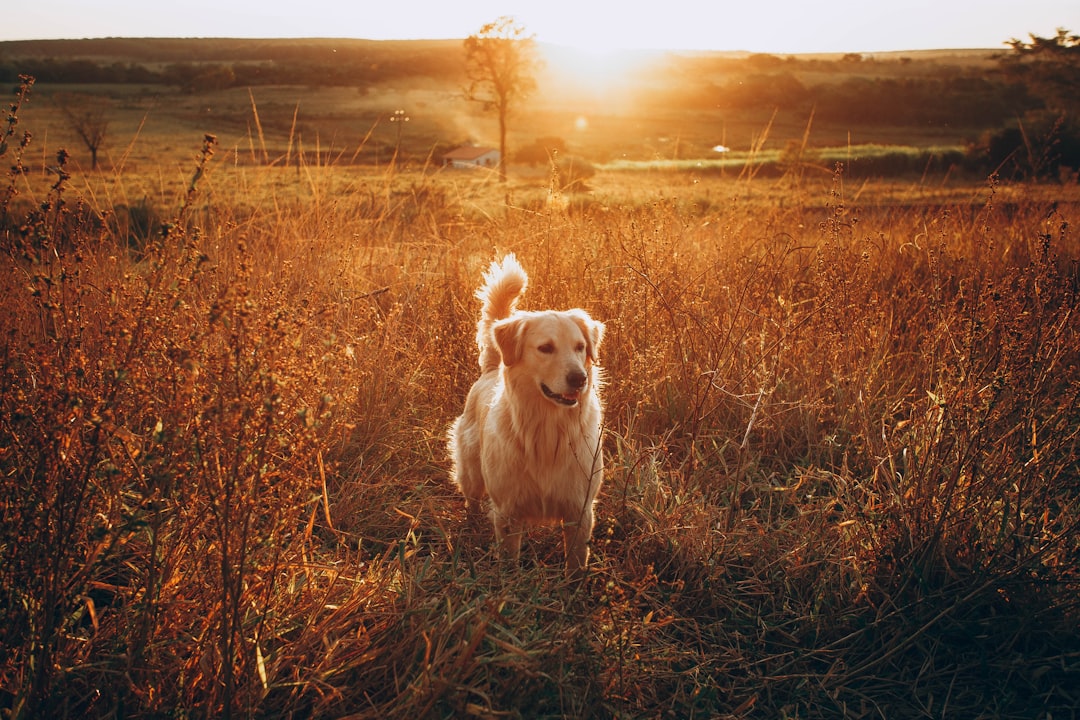The Golden Retrievers: Scotlands Loyal and Intelligent Companions
A brief overview of golden retrievers, including their history, physical characteristics, temperament, and health issues.
History and Origin
The history and origin of golden retrievers trace back to the Scottish roots where they were initially bred as working dogs. They were created by combining the best traits of the Flat-coated Retrievers, Tweed Water Spaniels, Red Setters, Labrador Retrievers, and Bloodhounds, resulting in a versatile and intelligent breed.
One interesting aspect of their history is that the breed was specifically developed to retrieve shot waterfowl during hunting, making them exceptional hunting companions. This purposeful breeding accounts for their keen retrieving instincts and love for water, which are still evident in the breed today. Their lineage and unique breeding history have contributed to the development of the Golden Retriever as a dedicated and skilled worker, excelling in hunting, field work, and search-and-rescue operations, while also being exceptional guides for the blind and excelling in obedience and competitive events.
History and Origin
Golden retrievers have a rich history that dates back to Scotland in the late nineteenth century. They were originally bred as gundogs, known for their remarkable hunting and retrieving abilities. The breed’s origin can be attributed to the meticulous work of Sir Dudley Marjoribanks, who carefully crossbred Flat-coated Retrievers, Tweed Water Spaniels, Red Setters, Labrador Retrievers, and Bloodhounds to create the golden retriever we know today.
One fascinating aspect of their history is the deliberate selection of traits to produce an all-round companion. For instance, the combination of the Tweed Water Spaniel’s swimming prowess and the retrieving instincts of the Labrador Retriever resulted in a dog well-suited to both waterfowl and upland game hunting. This intentional crossbreeding demonstrates the breed’s versatility and adaptability to various hunting terrains and conditions.
Furthermore, the breed’s Scottish roots play a significant role in shaping their characteristics, as they were initially developed to meet the specific needs of the Scottish hunting landscape. This historical context adds depth to the understanding of the breed’s traits and why they are highly valued for their working abilities and as beloved family pets.
Physical Characteristics and Appearance
Golden Retrievers are known for their distinctive physical characteristics and attractive appearance, which contribute to their popularity as pets and working dogs. In addition to their medium to large size, these dogs have a dense, water-repellent double coat that comes in shades of cream, yellow, or gold. This double coat serves as protection against the elements and is a defining feature of the breed.
Moreover, their broad head, dark eyes, wide muzzle, and large black nose give them an endearing and expressive face that exudes warmth and friendliness. These physical traits, combined with their gentle and affectionate nature, contribute to their status as one of the most beloved dog breeds globally. An excellent example of the breed’s striking appearance is showcased in the popular media where Golden Retrievers are often featured as iconic and lovable characters in movies, television shows, and advertisements, further emphasizing their appeal as pets.
Furthermore, the adaptability and versatility of Golden Retrievers in various roles, such as therapy work, search-and-rescue, and guide dog services, are a testament to their physical prowess and exceptional temperament. Their physical characteristics, complemented by their intelligent and trainable nature, make them highly suitable for a wide range of activities, from assisting individuals with disabilities to excelling in competitive dog sports [1][2].
Temperament and Personality Traits
Golden retrievers are renowned for their friendly and gentle nature, which makes them excellent family pets. Their affectionate and sociable temperament allows them to get along well with children and other pets, showcasing their adaptability and amiable personality. An example of their gentle nature can be seen in their role as therapy dogs, where they provide comfort, support, and companionship to individuals in hospitals, nursing homes, and other settings.
In addition to their friendly demeanor, golden retrievers are also known for their intelligence and problem-solving abilities. This makes them highly trainable and suitable for a variety of activities, including obedience trials, dog sports, and even search-and-rescue missions. Their exceptional retrieving instincts and willingness to learn new tasks contribute to their reputation as versatile and adaptable companions. An example of their intelligence can be observed in their success as guide dogs for individuals with visual impairments, where they demonstrate their ability to understand and execute complex commands to assist their owners.
 Training and Exercise Needs
Training and Exercise Needs
Golden retrievers are known for their moderate to high exercise needs, making them great companions for active individuals and families. These dogs thrive on regular physical activity and mental stimulation, which can include daily walks, playtime, and engaging activities such as agility training or interactive games. Due to their hunting and retrieving background, golden retrievers have a natural inclination to stay active and require outlets for their energy.
Furthermore, their intelligence and eagerness to please make them highly trainable. Whether it’s basic obedience, advanced commands, or specialized tasks, golden retrievers are quick to grasp training concepts and are eager to work alongside their owners. For instance, they are often employed in search-and-rescue missions due to their ability to follow commands and navigate challenging terrains.
In addition to physical exercise, mental stimulation is crucial for keeping golden retrievers content and well-behaved. Engaging them in puzzle toys, scent work, or training sessions not only fulfills their intellectual needs but also strengthens the bond between the dog and its owner. Their adaptability and enthusiasm for learning new skills make them an excellent fit for owners who enjoy training and engaging with their pets in various activities.
 Grooming and Care Requirements
Grooming and Care Requirements
Golden retrievers have a stunning double coat that requires regular grooming to keep it in top condition. Their dense, water-repellent fur not only sheds moderately throughout the year but also more heavily during shedding seasons. This means that consistent care, including brushing and bathing, is essential to prevent matting and maintain the health and appearance of their coat.
In addition to regular grooming, it’s important to pay attention to their ears, eyes, and teeth. Ears should be checked regularly for signs of infection or wax buildup, while the eyes should be kept clean and clear of any discharge. Brushing their teeth regularly is also crucial to prevent dental issues, as dental care is often overlooked but is an important aspect of their overall health and well-being. Providing them with high-quality food and ensuring they have access to fresh water at all times is vital to their health and vitality.
To illustrate the importance of grooming and care, consider the example of a golden retriever named Max. Max’s owner noticed that during shedding seasons, Max would become uncomfortable due to the increased shedding and potential matting of his coat. However, with consistent grooming and care, Max’s coat remained healthy and lustrous, and he was much more comfortable throughout the year.
By dedicating time to grooming and overall care, golden retriever owners can ensure that their loyal companions not only look their best but also feel their best, promoting their overall health and well-being.
## Health Issues and Common Diseases Golden Retrievers are susceptible to health issues such as hip and elbow dysplasia, cancer, and heart conditions. They have a high prevalence of specific types of cancer, including hemangiosarcoma and lymphoma, which necessitates regular health check-ups and preventive care to ensure their well-being. Understanding and addressing these health concerns are crucial for maintaining the overall health of the breed. References: * [1] https://www.akc.org/dog-breeds/golden-retriever * [2] https://dogtime.com/dog-breeds/golden-retriever * [3] https://en.wikipedia.org/wiki/Golden%5FRetriever


